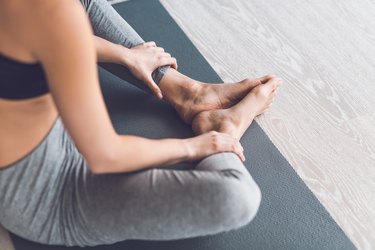
Groin injuries are common — especially if you play sports. While this painful condition is healing, you can still do upper body cardio exercises with a groin strain. There are also specific groin strain treatment exercises that can help your symptoms.
Groin pain is most commonly caused by a muscle strain. But it can also be a sign of a more serious condition, such as a pelvic stress fracture, according to an April 2018 article published by Journal of Orthopaedic & Sports Physical Therapy.
Video of the Day
Video of the Day
See a doctor for a diagnosis of the cause of your groin pain. For best results, perform groin strain treatment exercises under the supervision of a physical therapist.
Read more: How to Loosen Tight Groin Muscles With Yoga
Groin Strain Treatment Exercises
Groin strain treatment exercises target the hip adductor muscles along your inner thighs, as recommended by the American Academy of Orthopaedic Surgeons, and the hip flexors along the front of your thighs.
Groin stretches can be performed in several different positions, as recommended by the National Information Center of Medical Sciences. Hold each stretch for 20 to 30 seconds, and repeat three times.
Stretches might be uncomfortable — but avoid stretching to the point of pain. This can indicate damage to your muscles.
Move 1: Butterfly Stretch
- Sit on the ground.
- Bend your knees and bring the soles of your feet together.
- Pull your heels in toward your groin until you feel a stretch along your inner thighs.
- Gently press down on your knees to increase the stretch.
Move 2: Runner's Stretch
- Stand with your feet hip-width apart.
- Step your uninvolved leg forward, about 2 feet.
- Bend your front knee.
- Keeping your back knee straight, slowly shift your weight over your front knee until you feel a stretch along the front of your thigh.
Move 3: Straddle Stretch
- Sit with your legs straight out in front of you.
- Keeping your knees straight, spread your legs apart as far as you comfortably can.
- Reach your hands toward your toes and hinge forward at your hips.
- Stop when you feel a strong pull along your inner thighs.
Move 4: Standing Hip Flexor/Groin Stretch
- Stand with your feet wider than hip-width apart.
- Bend one knee.
- Raise your arms out to your sides at shoulder level.
- Shift your weight sideways, over the bent knee.
- Stop when you feel a stretch in the front and inside of your straight leg.
Move 5: Kneeling Hip Flexor Stretch
- Kneel down on your affected leg.
- Keep your other knee bent and your foot flat on the ground in front of you.
- Slowly shift your weight over your front leg.
- Stop when you feel a pull along the front of your back leg.
- Increase the intensity of this stretch by reaching behind and grabbing your back foot.
- Gently pull your heel toward your buttocks.
Move 6: Knee to Chest
- Lie on your back.
- Bend the knee on your unaffected leg toward your chest.
- Keep the opposite leg straight.
- Use your hands to gently pull your knee closer to your chest.
- Stop and hold this stretch when you feel a pull along the front of your thigh, on your straight leg.
- Journal of Orthopaedic & Sports Physical Therapy: "Clinical Examination, Diagnostic Imaging, and Testing of Athletes With Groin Pain: An Evidence-Based Approach to Effective Management"
- American Academy of Orthopaedic Surgeons: "Hip Conditioning Program"
- National Information Center of Medical Sciences: "Flexibility (Hips/Groin)"
Is this an emergency? If you are experiencing serious medical symptoms, please see the National Library of Medicine’s list of signs you need emergency medical attention or call 911.